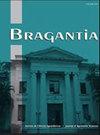Is it possible to apply the regional frequency analysis to daily extreme air temperature data?
IF 1.5
4区 农林科学
Q2 AGRICULTURE, MULTIDISCIPLINARY
引用次数: 0
Abstract
: The improvement of probabilistic assessments of extreme air temperature events is a major goal for agrometeorological studies. The regional frequency analysis based on L-moments (RFA-Lmom) has been successfully used to improve the study of hydrometeorological variables such as extreme rainfall events. This study investigated the hypothesis that the RFA-Lmom can be applied to extreme maximum (Tmax) and minimum (Tmin) air temperature data. The RFA-Lmon was calculated considering its original algorithm (multiplicative approach) and a new procedure referred as to additive approach. The suitability of both approaches was evaluated through Monte Carlo experiments, which simulated homogeneous and heterogeneous groups of Tmin and Tmax series, and through a case study based on weather stations situated in the state of São Paulo, Brazil. The results found in this study indicated that the RFA-Lmom can be applied to Tmax and Tmin data in tropical/subtropical regions such as the state of São Paulo. In addition, the additive approach consistently outperformed the multiplicative approach. Both discordance and heterogeneous measures presented their best performances when calculated under this new approach. The original goodness-of-fit measure may also be replaced by its bivariate extension when the group is formed by more than 15 series.是否有可能将区域频率分析应用于每日极端气温数据?
改进极端气温事件的概率评估是农业气象研究的一个主要目标。基于l矩的区域频率分析(RFA-Lmom)已被成功地用于改进极端降雨事件等水文气象变量的研究。本研究探讨了RFA-Lmom可以应用于极端最高(Tmax)和最低(Tmin)气温数据的假设。在计算RFA-Lmon时,采用了原算法(乘法法)和新算法(加性法)。通过模拟Tmin和Tmax系列同质和异质组的蒙特卡罗实验,以及基于巴西圣保罗州气象站的案例研究,对这两种方法的适用性进行了评估。本研究结果表明,RFA-Lmom可以应用于圣保罗州等热带/亚热带地区的Tmax和Tmin数据。此外,加性方法的性能始终优于乘法方法。在此方法下,不一致度量和异质度量均表现出最佳性能。当组由超过15个序列组成时,原始的拟合优度度量也可以用它的二元扩展来代替。
本文章由计算机程序翻译,如有差异,请以英文原文为准。
求助全文
约1分钟内获得全文
求助全文
来源期刊

Bragantia
AGRICULTURE, MULTIDISCIPLINARY-
CiteScore
2.40
自引率
8.30%
发文量
33
审稿时长
4 weeks
期刊介绍:
Bragantia é uma revista de ciências agronômicas editada pelo Instituto Agronômico da Agência Paulista de Tecnologia dos Agronegócios, da Secretaria de Agricultura e Abastecimento do Estado de São Paulo, com o objetivo de publicar trabalhos científicos originais que contribuam para o desenvolvimento das ciências agronômicas.
A revista é publicada desde 1941, tornando-se semestral em 1984, quadrimestral em 2001 e trimestral em 2005.
É filiada à Associação Brasileira de Editores Científicos (ABEC).
 求助内容:
求助内容: 应助结果提醒方式:
应助结果提醒方式:


